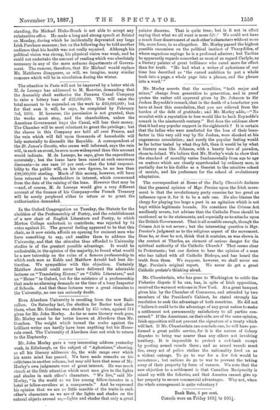Mr. John Morley gave a very interesting address yesterday week,
in Edinburgh, on the subject of "Aphorisms," showing. as all his literary addresses do, the wide range over which his acute mind has passed. We have made remarks on his criticisms in another column, but may add here that some of Mr. Morley's own judgments were of great interest. He was much struck at the little attention which most men give to the lights and shades in each other's characters. " We live," said Mr• Morley, "in the world as we live among fellow-inmates in a hotel or fellow-revellers at a masquerade." And he expressed his opinion that we are as little sensible of the traits in each other's characters as we are of the lights and shades on the natural objects around ns,—lights and shades that only a great painter discerns. That is quite true; but is it not in effect saying that what we all want is more life ? We could not have a much finer discernment of each other's characters without more life, more force, in us altogether. Mr. Morley passed the highest possible encomium on the political instinct of Thucydides, of whose sagacious sayings he is a profound admirer; but Tacitus he apparently regards somewhat as most of us regard Carlyle, as a literary painter of great brilliance who cared more for effect than for truth. "He had what a writer of aphorisms of our time has described as 'the cursed ambition to put a whole book into a page, a whole page into a phrase, and the phrase into a word.' "























































 Previous page
Previous page